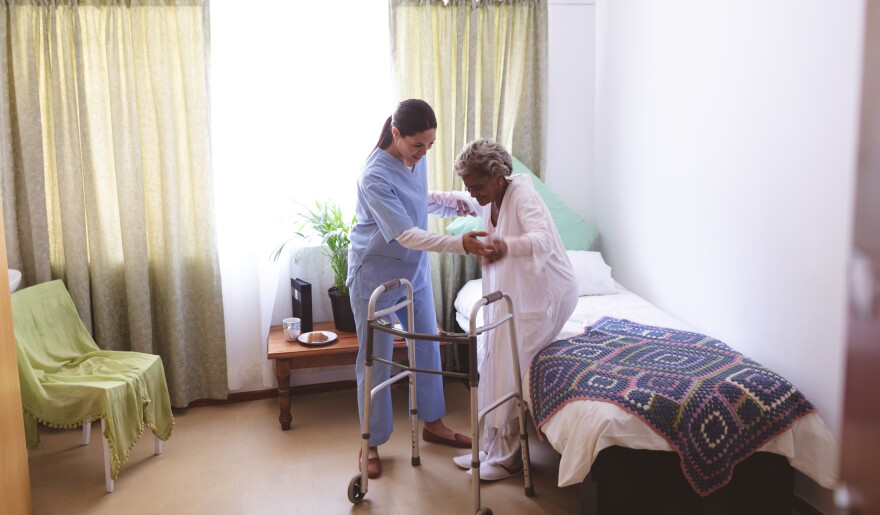A new agreement allows nurses licensed outside of Pennsylvania to more easily work in the state. But industry advocates and workers in long-term care say even more help is needed to alleviate staffing pressures.
On Sept. 5, Pennsylvania partially implemented the Nurse Licensure Compact, meaning out-of-state nurses with a multistate license can provide in-person and telehealth care in the commonwealth. More than 40 states and territories are already part of the agreement, which affects registered nurses and licensed practical nurses.
The compact does not yet allow Pa. nurses to use their licenses in NLC-participating states. In a statement, the Pa. Department of State said it’s working to make that happen “as quickly as possible.”
While the Pennsylvania Health Care Association advocated for the compact, President Zach Shamberg said he hopes legislators bring other solutions to the table. The state needs to approve money to attract and retain staff in long-term care facilities, he said.
“If we're not competitive with our wages… with our benefits and our bonuses and our incentives for workers, we will lose those workers to other compact states,” Shamberg said. PHCA is pushing for increased Medicaid reimbursement rates, which would allow facilities to invest in staff, Shamberg said.
Jim Brogna with Allied Services Integrated Health System agrees with PHCA and says in-state licensure times could be improved, too.
"The red tape and delays for new graduates and transfers and all professional licenses continue to affect post-acute and long-term care staffing every day significantly," Brogna said.
There’s no guarantee that out-of-state nurses will look for jobs in nursing homes, said Janet Yontas, director of practical nursing at the Career Technology Center of Lackawanna County. For some, “it’s no longer as beneficial to go into long-term care,” she said. “It’s a lot of work, it’s back breaking.”
Licensed practical nurses now have more options, she said. Ten years ago, 77% of Yontas’s graduates went into long-term care. Now, only 33% of recent grads have taken jobs in long-term care facilities, with about 35% going into hospitals or acute care settings. New LPNs tell Yontas that acute care jobs often have higher wages and more manageable staffing ratios.
Mandates for staff-to-resident ratios in Pa. nursing homes went into effect on July 1. There must be one certified nursing assistant for every 12 residents and one licensed practical nurse for every 25 residents on day shifts. That means 2.87 hours of direct care per day. On July 1, 2024, the mandate will increase to 3.2 hours.
Unions have hailed the ratios as a safeguard against worker and resident health. Last week, President Joe Biden announced federal guidelines for nursing homes, too. Administrators have pushed back against a federal mandate, saying states can determine what's best for themselves.
LeahBeth Evans, an LPN in northeastern Pa., said as staffing ratios improve for workers, out-of-state nurses might be looking to long-term care facilities for work. She thinks increased pay would be even more effective. She's seen LPNs leave nursing homes for hospital jobs.
"If more funds are given to increase the [pay] rates for nurses, then you might see some of these nurses come back [to nursing homes]," she said.
Administrators anticipate that a state nursing shortage will grow in coming years. A January report from the Hospital and Healthsystem Association of Pennsylvania estimated the state could have a deficit of 20,000 registered nurses by 2026.


